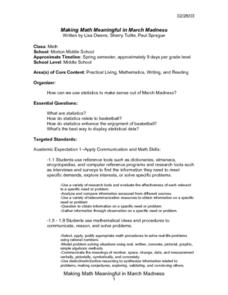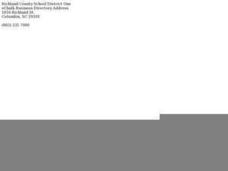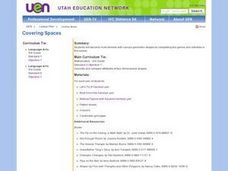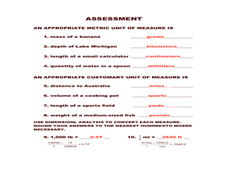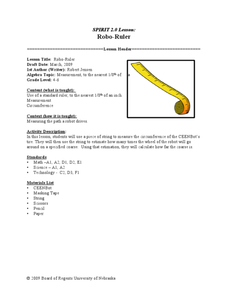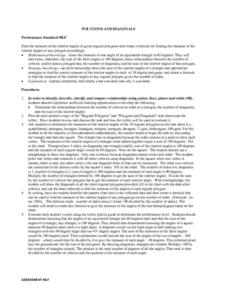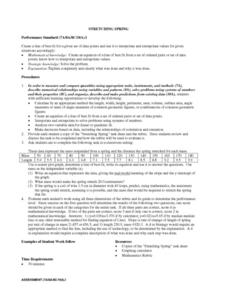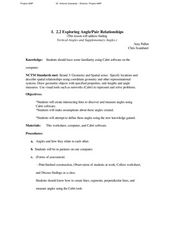Curated OER
More Jelly Bean Math
Students use their color categorized jelly beans to find the range, mean, median and mode. They use their recorded data documenting how many jelly beans there are for each color in order to calculate the range, mean, median and mode of...
Curated OER
How are Trig Ratios Used to Measure Triangle Sides
Students identify the ratios of trig identities. In this geometry lesson, students solve the missing sides and angles of triangles using trig ratios. They relate the graphs and waves to real life scenarios.
Curated OER
Making Math Meaningful in March Madness
Young scholars examine the statistics of March Madness, the college basketball tournament. They watch videotaped basketball games to collect data for further analysis using Word and Excel. They analyze the data in a variety of activities...
Curated OER
Math Internet Scavenger Hunt
Students utilize online research skills to surf the Internet and complete an online scavenger hunt to find the answers to various mathematical questions.
Curated OER
Fractions: Mud Pie Math
Second graders identify and name fractional parts through the use of mud pie manipulatives. In this fractional manipulatives lesson plan, 2nd graders identify and label halves, thirds, fourths, sixths, eighths, and tenths and order them...
Curated OER
Math: Geometric Fun and Games
Third graders discover geometric shapes by completing a series of games and activities. Using ropes with knots tied every foot, they make shapes such as squares, triangles, and hexagons. In pairs, 3rd graders use pattern blocks to...
Curated OER
Math and Circumference
Sixth graders explore geometry by utilizing mathematical formulas. In this circumference lesson, 6th graders identify the difference between diameter, circumference and radius in a circle. Students review the formulas for finding...
Curated OER
Count on Math
Students develop number sense up to a million. In this developing number sense up to a million lesson, students count their breaths in given time span. Students use blocks representing 10's and 100's to create a...
Curated OER
Triangles Inscribed in a Circle
Are you tired of answers without understanding? Learners can give a correct response, but do they really understand the concept? Have young mathematicians think deeper about linear functions, angles, and formulas in algebra....
Curated OER
Perfumania
Students identify various geometric shapes. Apply the given formulas to determine the volume of these shapes. Design their own container to conform to specifications provided. Use their knowledge of volume formulas and shapes to compute...
Curated OER
A Unified China
Students examine the major changes Qin accomplished as emperor. They look at his steps to unify China, create a money standard, measurement standards, and a system of bureaucracy.
Curated OER
Electronic Circuit Design
Learners design circuits to power 3-9 volt devices such as CD players or flashlights. After measuring the voltage and current requirements for the item, they design a loaded voltage-divided circuit to power it. Students work in teams to...
Curated OER
Consistent Circles
Students create a design of a circle. In this geometry lesson, students identify the measure of the diameter and radius of a circle. They graph and analyze their collected data and write equations based on direct variation.
Curated OER
Algebra/Geometry Institute: Area, Circumference, Perimeter
Students solve area problems. In this area, circumference, and perimeter lesson, students solve area and perimeter problems using standard and metric units of measure. They identify the best customary unit of measure for a...
Curated OER
Robo Ruler
Students calculate measurements using different units and fractions. In this algebra lesson, students measure the path that a robot drives. They use a piece of sting to do their measurement and calculate the circumference of the robot's...
Curated OER
Estimation Zone
Young scholars explore estimation. They estimate distance, weight, temperature and elapsed time. Students record their estimates and justify their estimations wtih a written response. After estimating, young scholars take the actual...
Curated OER
Polygons and Diagonals
Students practice measuring the interior angles of given regular polygons and create a formula for finding the measure of th interior angles of any polygon. They determine the relationships between the number of vertices's or sides in a...
Curated OER
STRETCHING SPRING
Students calculate the length, width, height, perimeter, area, volume, surface area, angle measures or sums of angle measures of common geometric figures. They create an equation of a line of best fit from a set of ordered pairs or...
Curated OER
"Where Does Pi Come From?"
Fifth graders explore geometry by exploring Pi. In this circle measurement lesson, 5th graders identify the relationship between the radius, diameter and circumference of a circle and how Pi is the key to unlocking any circular...
Curated OER
Baseball Proportion
Students work on different mathematical skills that align with state standards. The skill of problem solving is done with reasoning and communication is made to students through solid brain connections to the math concepts.
Curated OER
Can You Canula?
Students calculate the circumference of a circle. In this geometry lesson, students measure the diameter of a circle using micrometers or calipers. They investigate the relationship of the diameter to that of the value of Pi.
Curated OER
Exploring Angle/Pair Relationships
Students find missing angles and sides of triangles. In this geometry lesson, students create intersecting lines to measure angles. They use Cabri Software to create virtual angles.
Curated OER
Appalachia
Young scholars investigate the benefits of dance and participate in dances. For this dance lesson, students investigate a number of dances such as square dancing and clogging that are native to Appalachia. They use math concepts to...
Curated OER
Fertilizers, Pesticides and Health
Students apply real data to create and calculate algebraic equations. Students create a visual to represent the concentration for one part per million and apply unit analysis to verify measurement computations. Students define the use...


